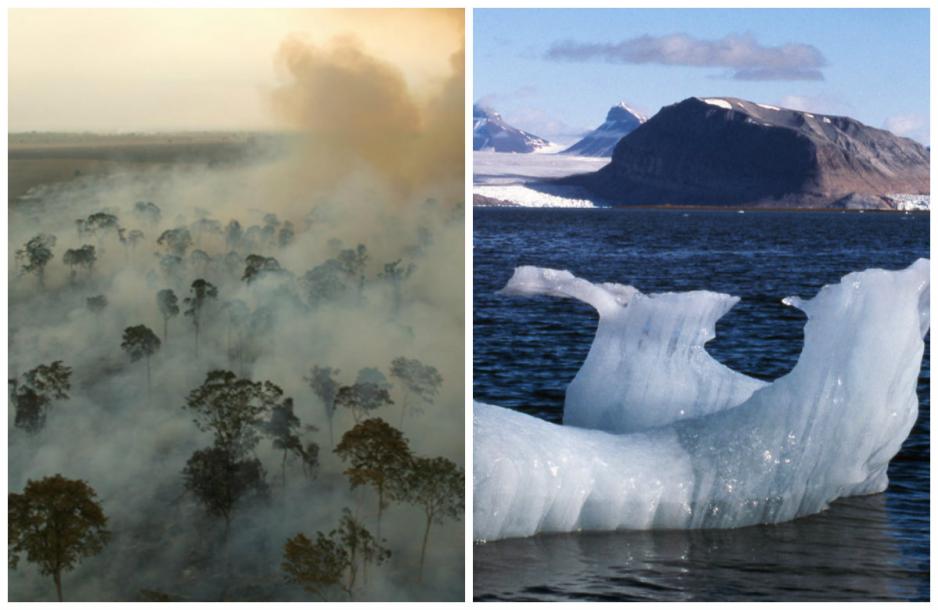Everyone Wants to Go to the Arctic, But No-One Wants to Live There

Forest fires in the Amazon, Brazil and melting sea ice near Spitsbergen, Norway. There is much that goes to link the two, writes Editor-in-Chief Arne O. Holm. (Photo from Brazil: FAO of the UN, photo from N Ålesund, Norway: Peter Prokosch/GRID Arendal)
While the agrarian Centre Party appears to be ahead of the game in the polls before next week’s local elections in Norway, and threatens to knock out all competitors in the run for mayors in Northern Norway, an increasing number of powerful nations knock on the door of the Arctic. The last one to do so is Germany, a country which – despite the distance – is looking to have decisive influence in the High North.
That places us, as humans and nations, at the center of major and challenging dilemmas.
How are independent states, like Norway, to meet demands about decisive political influence from countries in the opposite end of Europe? To what extent should we allow people who will never live in the Arctic to make decisions that affect everyday life in the Arctic?
Mix of people and ideology
Eight states are included in the Arctic family; Norway, Denmark, Iceland, Canada, Russia, the USA, Finland and Sweden. The Arctic Family, if you will, consists of both small countries like Norway and larger powers like the USA and Russia.
A mixture of people and political ideology, with a common purpose built around the Arctic Ocean.
The American Foreign Minister Mike Pompeo stirred attention when he lashed out against China’s desire about influence in the Arctic a while ago. Raging on the podium, he told the audience in Rovaniemi, Finland that there are only two kinds of states: Arctic and non-Arctic. The Chinese version of a “near-Arctic state” was not on his table. Nor was the influence China desires to have on Arctic politics and development.
However, China is not by far the only non-Arctic state to vie for influence in the High North.
Wants to protect the Arctic
Germany wants, according to its recent Arctic Strategy, to have “binding legal regulations about exploration and exploitation of mineral resources”, and “legally binding regulations about use and exploration of the Arctic”. Germany also wants to introduce what it refers to as protected zones in the Arctic.
The reason for these demands is primarily the concern for climate and environment. However, Germany’s powerful Chancellor Angela Merkel adds that is also has to do with Germany’s strategic interest in the High North.
Initially pretty noble motives, in other words, from a nation that with its emissions is strongly contributing to increased temperatures in the Arctic. As we all know, it is easer to solve climate challenges on a safe distance from its consequences. In that respect, Germany and Norway resemble one another.
The dilemma nevertheless arises because the German worries about Arctic climate require setting national decisions aside in favor of international agreements.
Establishing protected areas, agreements placing a ban on mining, and a more general demand for international agreements for use of the Arctic go far into violating the eight Arctic states’ independence and right of self-determination.
International cooperation
There is no doubt that the solution to climate changes, in the Arctic as well as elsewhere, requires international cooperation. However, does that mean that states like Norway should give in to the German, and most likely later also the EU’s, demand for protection at the expense of national right of self-determination over our own territory? That could have major consequences for those of us who live in the High North and do not hold a vote in the EU.
However, nor is Norway as a nation a stranger to putting political pressure on national decisions in countries far away from our own reality.
Norway’s use of power
In this year’s local elections campaigns, Brazil has appeared on the agenda. The background for this is worries about the rain forest in Brazil, combined with a newly elected Brazilian president. Jair Bolsonaro, a Brazilian version of Donald Trum, has challenged almost everyone when it comes to climate and traditional political civility. Norway uses threats about withdrawing from the trade agreement with Brazil as well as shutting down the so-called Rain Forest Fund.
Thus, we are no strangers to using political pressure to influence other nations as long as it serves values we place higher than the right of national self-determination.
We risk getting a taste of our own medicine, in more civilian forms, if Germany’s Arctic appetite were to become a part of the EU’s Arctic Policy.
It that happens, the Center Party’s rise to democratic power will just be small waves on the water by comparison.

